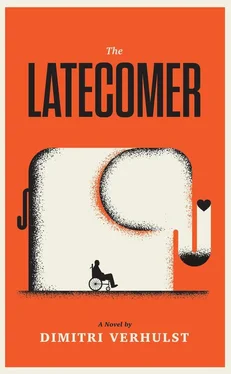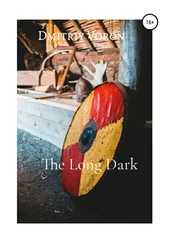
Many conflicts later we were in Brasserie Vivaldi and Moniek still hadn’t reconciled herself to the convictions of her long-grown-up daughter. ‘Just take the chicken, I’ve heard it tastes just like that Quorn of yours! Your metabolism will be so overjoyed it’ll be doing somersaults inside your body!’
But the waiter was able offer her a moussaka made with a meat substitute and that really was vastly superior to the eternal cheese croquette.
‘I’m not such a difficult character,’ Moniek told the young man. ‘The meatballs in tomato sauce will be just fine. Simple meatballs in simple tomato sauce.’
And since I was no longer considered especially independent, she ordered for me too while she was at it: my personal classic, steak with pepper sauce, rare, and chips with extra salt.
‘No,’ I corrected her. ‘No, I’ll have the vegetarian moussaka too.’
‘OK, fine, two vegetarian moussakas. Got it. Anything else?’
‘Um, maybe another glass of champagne? Yes, I see my daughter nodding … Two glasses of champagne! And some more tap water for my wife. Thank you.’

If I had still wanted to die in my own house, speed would have been of the essence, because it had finally arrived: the long-awaited day I would take up residence in an old folks’ home — Winterlight, as I’d discover a few hours later. A run-of-the-mill Saturday, created for cleaning windows, washing cars, doing the shopping, ferrying children to sports’ clubs and taking rubbish to the dump. But not for me.
Our Hugo had long stopped seeing his father’s birthday as an obligation to honour the parental home with his presence. Pumped-up commercial celebrations like New Year, Mother’s Day and Christmas left him cold, and I actually envied him that enormously. He was a completely unsentimental character with a busy life that left little room for cake and chats with his makers. Moniek dedicated melodramatic arias to the subject, accusing her son of ingratitude, which only reduced his desire to come back next time.
Now he was here. Badly shaven. But here.
Perhaps his mother — or his sister — had appealed to his masculine expertise and the attendant responsibilities. And though he was no longer a young Spartacus but a desperate forty-something in search of the right pillow to finally vanquish his neck ache, Hugo could still be of service to the family by disassembling a small wardrobe and putting it back together somewhere else. There was also an old television cabinet to get down from the attic and the single bed in the guest room that would be making the move with me: men’s work!
It was a mystery to me who’d come up with the idea, but they had evidently decided that my last breakfast at home would be a family event with all of us. The children, Moniek and me. Without any annoying in-laws. Just the four of us.
Charlotte arrived on the scene with her eyes still showing signs of a crying fit. And with a bag full of pastries, fresh from the bakery and still slightly warm. Everyone in the family knew my weakness for vanilla cream. Before taking his place in the electric chair, serial killer Ted Bundy requested steak and eggs; Victor Feguer (‘the last man Uncle Sam executed’) swore by an unpitted olive; I definitely had no objections to a Berliner as my last meal. Filled with pastry cream (I didn’t like the jam variety). That’s just to show how delicious I found them. But when I was in my prime Moniek had deprived me of this treat as much as she possibly could: ‘Aren’t you fat enough? Your arteries are already clogged up from all that wine you guzzle!’
This time she kept her trap shut.
Were my suspicions correct and had she taken some kind of sedative?
Hugo squeezed oranges and, judging by the adroitness with which he squirted juice at the ceiling, this was the first time in his existence. Giuseppe Tartini’s cello concerto was playing, a composition I hadn’t expected to hear again until my own funeral. My wife didn’t like it; she didn’t like Tartini at all. Just as she didn’t like Bach or Pärt or Bruch. My taste was too melancholy for her. Definitely so at breakfast. ‘Coffee and a funeral march, what a way to start the day!’
And I took it and never even had the balls to get myself some headphones. I took it and, with all my stuffy, fuddy-duddy ways, derided headphones as the symbol of a new, antisocial generation. How much more I could have enjoyed music …
But now, in a hopeless, despairing, futile attempt to make amends, I was being mollycoddled.
Once again Charlotte turned out to be the mainstay of this broken family.
‘Father …’
‘Yes?’
‘Father, do you know what’s happening today?’
‘Yes.’
‘What?’
I didn’t say anything.
‘What, Father? Can you tell me? What are we going to do today?’
‘Yes.’
‘We’re going to take you to a home!’
This conversation was too much for Moniek, who had started on the washing up.
‘It’s only temporary, Father. I want you to know that it’s only temporary and that we’re doing it because we love you and want to take care of you as best we can.’
‘Yes.’
‘But you’ve just been through a very turbulent period and you need to recover a little in your head. Once the tests have been done and you’re back on track, you’ll be coming straight back home. Do you understand?’
‘Yes.’
The ease with which she lied to me was impressive. All with the kindest of intentions, perhaps, but I couldn’t help wondering how often she’d gulled me before. What a talent for dissemblance! Admittedly, I wasn’t well placed to reproach her on that account.

We were going to drive there in two vehicles. Apprehensive as he was about overwrought emotions and the extremely predictable blubbering of the females once I was being driven out of our front gate never to return, Hugo had decided to fill his car with all the necessary gear: three suitcases full of clothes — pyjamas and track-suit bottoms mainly — plus the furniture for my new room. Moniek and I could go in Charlotte’s car.
‘It’s all packed,’ Hugo panted.
A death knell would have sounded more cheerful.
There was nothing keeping me here.
The neighbours had positioned themselves strategically to watch my silent departure. One was weeding his front garden, another was pushing a lawnmower over the same patch of lawn for the fourth time that morning. Many of them were contemporaries, of course, who had moved to the street at more or less the same time as us. Our houses are more or less the same age. Our bodies too. Our children grew up with each other, we received our first summons for a prostate check together and talked about it at the same street parties. Perhaps somewhere, in a back room of the heart, they were saddened for my sake alone, but mainly they experienced my moving to a home as a confrontation with themselves: their generation, their imminent demise.
Marie-Louise from number 31 was the only one to stand out on the street unabashed with a good half of her face buried in a hankie. She too was made up of sixty per cent water and that morning it was bursting to get out. From the top end, of course.
‘Dad, will you come and sit next to me in the car? With Mother in the back? Hugo will follow in his own car … Come on!’
Читать дальше














